Wimbledon, London
June 25, 1984; 128 Draw (16 seeds) – $993,365; Surface – Grass
All scorelines
First round: (United Press International)
Top seed John McEnroe, behaving impeccably for a packed Center Court and letting his racket speak for him, today began defense of his Wimbledon singles crown with a hard-fought 6-4, 6-4, 6-7(7), 6-1 victory over Paul McNamee. McNamee saved three match points in the 3rd set. The volatile American, reassured there would be no witch hunt against him because of his truculent reputation, produced nothing to excite officials or the suspicious British press in his first-round match except a flawless, 155-minute display against the plucky Australian. All England club chairman Buzzer Hadingham personally wrote to McEnroe on the eve of the championships, welcoming him to the $2.2 million tournament and promising umpires would not single him out for unfavorable treatment. “I’ve decided to let my racket do the talking,” McEnroe said. “I am just concentrating on my tennis.” The 25-year-old New Yorker, bidding to become the first American to capture back-to-back titles since Don Budge in 1937-38, stirred fresh antagonism among British sports writers earlier this month when he acted up at a grasscourt prep, calling the umpire a “moron.” Officials lectured players last night about their conduct during the championships and Hadingham said referees would be supported if they took ”drastic action” against temperamental stars. “I would like to think that John McEnroe is facing a fortnight when he is not going to blow his top,” Hadingham said. Ivan Lendl of Czechoslovakia, seeded to meet McEnroe in the final and keenly aware that he has handed the American his only defeat in 49 matches this year, was pushed to five sets by American Dick Stockton on No. 1 court. Lendl, French Open champion but so far without a Wimbledon crown during his big money career, recovered from losing the first to outlast Stockton, 4-6, 6-0, 6-3, 5-7, 6-4. In the first upset of the championships, Swedish No. 10 seed Anders Jarryd was beaten 4-6, 6-4, 6-3, 6-2 by Scott Davis, a 21 year-old Californian ranked 24th on the ATP list. Jarryd handicapped himself with a series of unforced errors and poor serving and grew timid of approaching the net. Davis, meanwhile, grew in confidence with a positive serve and volley philosophy. Sweden’s ninth-seeded Henrik Sundstrom breezed past Belgium’s Bernard Boileau 6-4, 7-6(4), 6-4 on the back of a typically strong service game. The 20-year-old right-hander, winner of this year’s Monte Carlo Open and one of the few leading Swedes to favor a one-handed backhand, broke the Belgian champion in the eighth game to wrap up the first set and always was in command of the tie breaker to win the second. Boileau reasserted himself briefly in the third set but a perfectly placed drop shot in the 9th game of the third set gave Sundstrom the vital break o serve he needed to wrap up the match. American-based Nduka Odizor of Nigeria, who as a qualifier scored a surprise first-round win over Guillermo Vilas last year before advancing to the last 16, defeated American Jeff Turpin, 6-2, 7-5. 7-6(4). The Nigerian, nicknamed “The Duke,” 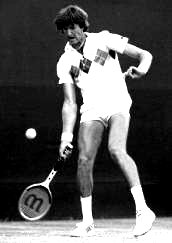 showed a flair for shotmaking at the crucial moments and always held the edge in service. Argentina’s Jose Luis Clerc, the No. 8 seed, joined seventh-seeded Frenchman Yannick Noah on the sidelines, withdrawing at the last minute due to illness without playing a stroke. In other action, Sweden’s Joakim Nystrom defeated American Tim Wilkison 5-7, 7-6(6), 7-5, 7-5, West Germany’s Hans Schwaier upset Indian veteran Vijay Amritraj 6-3, 6-4, 6-2 and Tom Gullikson beat fellow American Hank Pfister 6-3, 6-4, 5-7, 6-2. Kevin Curren, the 11th seed, who last year put Connors out of the tournament with 33 aces, nearly lost to his equally hard-serving friend Steve Denton. Denton held a two-sets-to-one lead, but Curren came back to win, 6-4, 3-6, 4-6, 7-6(4), 6-4. Jimmy Connors, the third tier in the tennis trinity, played a long, drawn-out affair with Lloyd Bourne, eventually winning, 7-5, 7-5, 6-4. Connors, who likes to play better gradually at the major tournaments, said he wasn’t concerned any longer with his fourth-round loss here last year. “I don’t think about losing last year, just like I don’t think about winning here the year before,” he said. Once again, Connors fielded an inquiry about his “mellowing,” especially in the McEnrovian era. “I haven’t changed that much,” Connors said. “It’s just that there’s someone out there who’s worse than I was.” 16-year-old West German, Boris Becker made a sensational Grand Slam debut (fifth tournament overall) trashing American Blaine Willenborg 6-0, 6-0, 6-4.
showed a flair for shotmaking at the crucial moments and always held the edge in service. Argentina’s Jose Luis Clerc, the No. 8 seed, joined seventh-seeded Frenchman Yannick Noah on the sidelines, withdrawing at the last minute due to illness without playing a stroke. In other action, Sweden’s Joakim Nystrom defeated American Tim Wilkison 5-7, 7-6(6), 7-5, 7-5, West Germany’s Hans Schwaier upset Indian veteran Vijay Amritraj 6-3, 6-4, 6-2 and Tom Gullikson beat fellow American Hank Pfister 6-3, 6-4, 5-7, 6-2. Kevin Curren, the 11th seed, who last year put Connors out of the tournament with 33 aces, nearly lost to his equally hard-serving friend Steve Denton. Denton held a two-sets-to-one lead, but Curren came back to win, 6-4, 3-6, 4-6, 7-6(4), 6-4. Jimmy Connors, the third tier in the tennis trinity, played a long, drawn-out affair with Lloyd Bourne, eventually winning, 7-5, 7-5, 6-4. Connors, who likes to play better gradually at the major tournaments, said he wasn’t concerned any longer with his fourth-round loss here last year. “I don’t think about losing last year, just like I don’t think about winning here the year before,” he said. Once again, Connors fielded an inquiry about his “mellowing,” especially in the McEnrovian era. “I haven’t changed that much,” Connors said. “It’s just that there’s someone out there who’s worse than I was.” 16-year-old West German, Boris Becker made a sensational Grand Slam debut (fifth tournament overall) trashing American Blaine Willenborg 6-0, 6-0, 6-4.
Second round: Steve Goldstein
Pat Cash is a strapping lad from Down Under, a former participant in the controlled violence of Australian football and a fan of heavy-metal rock bands. He plays tennis with strength rather than touch. Don’t get him angry. Former Aussie star John Newcombe did, saying that comparing Cash to Mats Wilander was “like comparing a crack in the wall to the Grand Canyon.” Yesterday, the unseeded Cash took it out on Wilander, scoring Wimbledon’s first major upset by ousting the fourth seed on Centre Court, 6-7(2), 6-4, 6-2, 6-4 in a fierce battle of 19-year-olds. Determination didn’t seem to be enough as the Swede took the opening tie-breaker in a well-played first set. It was obvious, however, that Wilander was taking something off his serve and his volley in deference to his injured right wrist. Characteristically, Wilander later refused to use the wrist as an alibi, saying that it didn’t hurt all that much. Cash knew otherwise. “I think his wrist injury stopped him from serving as well as he can,” Cash said. “He was serving at maybe three-quarters pace, and that was perfect for me.” The second and third sets fell rapidly to the Australian, as Wilander could do nothing to stem the Cash flow. He broke Wilander’s serve to open the 4th set and had two break points for a 4:1 lead, but Wilander rallied to hold serve and break Cash in the ensuing game for 3:3. Cash got the final edge by breaking the Swede in the ninth game with a miraculous off-balance forehand cross-court volley. Wilander managed to stave off one match point in the next game, but he lost the match on a classic Cash serve-and-volley combination. The other seeded men came through yesterday in fine form, for the most part – particularly John McEnroe, who thrashed helpless Rodney Harmon 6-1, 6-3, 7-5, in 1 hour, 48 minutes. Bill Scanlon, the 14th seed, scored an equally impressive victory, defeating Israel’s Shahar Perkiss, 6-2, 6-3, 6-3, and is only one triumph away from a fourth-round meeting with arch-enemy McEnroe. Chris Lewis, McEnroe’s unseeded opponent in last year’s final, fell in straight sets, 6-3, 6-3, 6-3, to India’s Ramesh Krishnan. The New Zealander’s second-round loss was the earliest departure by a finalist from the preceding year since defending champion Manuel Santana was beaten in the first round in 1967. Ivan Lendl, who is growing accustomed to the pace on grass, avoided upset on Court 2, Wimbledon’s Bermuda Triangle, with an easy 6-3, 6-1, 6-3 triumph over Derek Tarr of South Africa. “I just play automatically, almost like a machine, and it feels very well,” said Lendl. The Czech never had to get out of first gear. A third straight day of sunny, dry weather saw the promising newcomers split their matches. Greg Holmes, the 1983 collegiate champion, lost to local hero John Lloyd in four sets, while Scott Davis, who recently eloped with Susy Jaeger, Andrea’s older sister, knocked off Joakim Nystrom, his second straight Swede. Davis will now take on Lloyd. Gianni Ocleppo of Italy is No. 46 and had beaten Jimmy Arias only once in six matches – two years ago, in fact, when Arias was 17. Still, the Italian was up two sets to one and got into a fourth-set tie-breaker. Arias won the tiebreaker, and took the match 7-5, 5-7, 3-6, 7-6(4), 6-4 . “I played well for me today,” Arias said, but added that he still feels kind of disoriented. “I’m kind of lost out there,” he said. “I’m not sure of myself.” Grass is a serve-and-volley surface, but Arias said he is reluctant to come to the net. If he gets his first serve in, he said, he can control the point. Anything less than a high first-serve  percentage and he is in trouble. Arias is improving, yet he will have to improve a lot more in his next round. His opponent will be South African Danie Visser who, despite being ranked at No. 80, likes the grass and has not lost a set in two matches here. Johan Kriek, a compatriot of Visser’s who has become an American citizen, also is no stranger to grass. His opponent, Stefan Edberg, won the junior singles title here last year on the way to winning a junior Grand Slam. The Swede looked to be well on his way to making a dent in the big boy’s draw when he took the first two sets from Kriek (6-4, 7-6). Edberg got all the way to 4:4 in the 3rd set before yielding his first break point to Kriek, which the seeded player immediately capitalized on. That moment seemed to turn things around, for Kriek won the next three games, and seven of the next eight to draw even in the match. With his Prince Valiant haircut flapping in the breeze, Kriek gave the teenager a lesson is using all the angles of the court. His passing shots found the mark, and Edberg quickly tired of the torment, playing listless tennis in the final set, which was a 6-1 duplicate of the fourth set. Edberg is a promising player. Of the three Swedes who bit the grass yesterday – Nystrom and Stefan Simonsson, who lost to Jimmy Connors, 6-2, 6-1, 6-3, were the others – he is clearly the most talented. In fact, his route into the quarterfinals would have been relatively easy had he won yesterday.
percentage and he is in trouble. Arias is improving, yet he will have to improve a lot more in his next round. His opponent will be South African Danie Visser who, despite being ranked at No. 80, likes the grass and has not lost a set in two matches here. Johan Kriek, a compatriot of Visser’s who has become an American citizen, also is no stranger to grass. His opponent, Stefan Edberg, won the junior singles title here last year on the way to winning a junior Grand Slam. The Swede looked to be well on his way to making a dent in the big boy’s draw when he took the first two sets from Kriek (6-4, 7-6). Edberg got all the way to 4:4 in the 3rd set before yielding his first break point to Kriek, which the seeded player immediately capitalized on. That moment seemed to turn things around, for Kriek won the next three games, and seven of the next eight to draw even in the match. With his Prince Valiant haircut flapping in the breeze, Kriek gave the teenager a lesson is using all the angles of the court. His passing shots found the mark, and Edberg quickly tired of the torment, playing listless tennis in the final set, which was a 6-1 duplicate of the fourth set. Edberg is a promising player. Of the three Swedes who bit the grass yesterday – Nystrom and Stefan Simonsson, who lost to Jimmy Connors, 6-2, 6-1, 6-3, were the others – he is clearly the most talented. In fact, his route into the quarterfinals would have been relatively easy had he won yesterday.
Third round: Steve Goldstein
Third-seeded Jimmy Connors, twice a Wimbledon champion, broke the all-time record of singles victories at the famed grass-courts tournament Friday to advance to the fourth round. Connors, who captured the men’s singles title in 1974 and 1982, fought off a determined bid by Marty Davis, 6-4, 6-7(4), 6-3, 6-4, for his 65th Wimbledon singles victory in 14 years. The triumph broke the 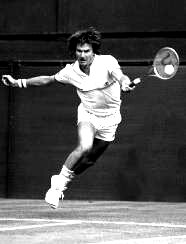 old mark of 64 set by Britain’s Arthur W. Gore between 1888 and 1927. “It is an honor to have won the most matches at Wimbledon than any other male player, but I play to win tournaments, not matches,” Connors said. “Maybe if I had won three or four more matches, I would have won this tournament a lot more. Hopefully, I am not finished yet.” Davis gave Connors all the 31-year-old left-hander could want in their third-round battle. “We played some good tennis out there,” Connors said. “Marty is a good player, especially on grass, and he was booming his serve.” Winning certainly wasn’t easy for Connors in the fading daylight on Court No. 1. He fell behind 4:2 in the opening set, only to reel off the next four games. And in the second set, after Connors jumped off to a 2:0 lead, Davis ripped off three straight games before the battled into a tiebreaker, which Davis won, 7/4. Connors dominated the third set, and although he closed out the match in the fourth, it wasn’t all that easy as he was forced to work for every single point. Three seeds were upset in this fifth day of play, including No. 9 Henrik Sundstrom of Sweden, who was ousted by Australian Mark Edmondson, 6-7(2), 7-6(2), 6-4, 6-7(6), 8-6, in a second-round match that began on Thursday but was halted by darkness after four sets. Heartbreak and heroism played leading roles at Wimbledon yesterday, capping the first week of the world’s premier tennis drama. John McEnroe advanced smoothly with a tranquil 6-0, 6-4, 6-3 victory over Wally Masur of Australia. But the storm flags were raised immediately afterward, for his opponent tomorrow in the fourth round is Bill Scanlon, a man who gets under the defending champion’s skin and who beat him at last year’s U.S. Open. Another interesting match-up will be that of Pat Cash, a talented young Australian, and Kevin Curren, who put out Jimmy Connors here last year. Cash lost only seven games to Cassio Motta of Brazil, while 11th-seeded Curren needed a tough 4-setter, 6-2, 3-6, 7-6(3), 7-6(3) to subdue Ramesh Krishnan. Curren had more than the graceful Indian to contend with. In the early hours, he learned of the death of his father in South Africa. Curren decided to continue through the tournament. Boris Becker‘s career is just beginning. The 16-year-old West German – the youngest male to reach the third round here – suffered a large setback when he tore ligaments in his left ankle. Becker, a strong right-hander with reddish-blond
old mark of 64 set by Britain’s Arthur W. Gore between 1888 and 1927. “It is an honor to have won the most matches at Wimbledon than any other male player, but I play to win tournaments, not matches,” Connors said. “Maybe if I had won three or four more matches, I would have won this tournament a lot more. Hopefully, I am not finished yet.” Davis gave Connors all the 31-year-old left-hander could want in their third-round battle. “We played some good tennis out there,” Connors said. “Marty is a good player, especially on grass, and he was booming his serve.” Winning certainly wasn’t easy for Connors in the fading daylight on Court No. 1. He fell behind 4:2 in the opening set, only to reel off the next four games. And in the second set, after Connors jumped off to a 2:0 lead, Davis ripped off three straight games before the battled into a tiebreaker, which Davis won, 7/4. Connors dominated the third set, and although he closed out the match in the fourth, it wasn’t all that easy as he was forced to work for every single point. Three seeds were upset in this fifth day of play, including No. 9 Henrik Sundstrom of Sweden, who was ousted by Australian Mark Edmondson, 6-7(2), 7-6(2), 6-4, 6-7(6), 8-6, in a second-round match that began on Thursday but was halted by darkness after four sets. Heartbreak and heroism played leading roles at Wimbledon yesterday, capping the first week of the world’s premier tennis drama. John McEnroe advanced smoothly with a tranquil 6-0, 6-4, 6-3 victory over Wally Masur of Australia. But the storm flags were raised immediately afterward, for his opponent tomorrow in the fourth round is Bill Scanlon, a man who gets under the defending champion’s skin and who beat him at last year’s U.S. Open. Another interesting match-up will be that of Pat Cash, a talented young Australian, and Kevin Curren, who put out Jimmy Connors here last year. Cash lost only seven games to Cassio Motta of Brazil, while 11th-seeded Curren needed a tough 4-setter, 6-2, 3-6, 7-6(3), 7-6(3) to subdue Ramesh Krishnan. Curren had more than the graceful Indian to contend with. In the early hours, he learned of the death of his father in South Africa. Curren decided to continue through the tournament. Boris Becker‘s career is just beginning. The 16-year-old West German – the youngest male to reach the third round here – suffered a large setback when he tore ligaments in his left ankle. Becker, a strong right-hander with reddish-blond  hair and a fearsome high-kicking serve, was giving Scanlon a difficult time on Court Two. They had split the first two sets, and Becker narrowly lost the third-set tiebreaker, 8/6, after leading, 4:1. The German was a service break up and was serving at 2:1, deuce in the 4th set, when he followed his serve to the net and attempted a forehand volley. Suddenly, he crumpled to the ground with a scream. Scanlon raced around the net to see what had happened. “His ankle had already swollen a couple of inches,” Scanlon said. “It looked as if he had stuffed golf balls in his sock.” Becker said he could not continue. He was carried off on a stretcher and was taken to a hospital, where X-rays revealed the torn ligaments. It was a particularly tragic injury for him, not only because he had a chance to win but because, having just turned professional, he will miss several tournaments to which he had been invited. Becker also was the top seed in the junior championship here. Becker came back on tour three months later.
hair and a fearsome high-kicking serve, was giving Scanlon a difficult time on Court Two. They had split the first two sets, and Becker narrowly lost the third-set tiebreaker, 8/6, after leading, 4:1. The German was a service break up and was serving at 2:1, deuce in the 4th set, when he followed his serve to the net and attempted a forehand volley. Suddenly, he crumpled to the ground with a scream. Scanlon raced around the net to see what had happened. “His ankle had already swollen a couple of inches,” Scanlon said. “It looked as if he had stuffed golf balls in his sock.” Becker said he could not continue. He was carried off on a stretcher and was taken to a hospital, where X-rays revealed the torn ligaments. It was a particularly tragic injury for him, not only because he had a chance to win but because, having just turned professional, he will miss several tournaments to which he had been invited. Becker also was the top seed in the junior championship here. Becker came back on tour three months later.
Fourth round: (Daily Breeze)
Defending champion John McEnroe, playing what he called his best match of the tournament, dismissed Bill Scanlon in straight sets today, 6-3, 6-3, 6-1, as the Wimbledon championships entered their second week. But three other top men’s seeds were eliminated. McEnroe needed a single service break to take the first set in 37 minutes. At *3:2 in the 2nd set, Scanlon, seeded 14th, scored his only service break when McEnroe double-faulted. But the fiery 25-year-old roared back to win eight straight games, take a 2-0 lead in sets and a 5:0 advantage in the final frame. “Once I broke back, I really dominated the match,” McEnroe said. “I was concentrating well, which helped my overall game. If I can just keep that up, I’ve got a good chance the next couple of rounds.” McEnroe and Scanlon had unkind words about each other in post-match interviews  Saturday, and today’s contest was seen as something of a grudge match – a chance for Scanlon to avenge his loss to McEnroe here last year or for McEnroe to do the same for his upset at the Texan’s hands in the U.S. Open. The start of play had been delayed by a series of downpours and when it resumed, Johan Kriek went down quickly, 6-3, 6-2, 6-4, to 21-year-old Paul Annacone, a qualifier playing in his first tournament after turning pro. Last year, the right-hander from New York was ranked 256th in world. Right behind Kriek was Jimmy Arias, playing out of his element on grass. He fell to Tomas Smid of Czechoslovakia, another clay court specialist, 7-5, 6-4, 6-3. Last to fall was Vitas Gerulaitis, who opened play on No. 2 court with John Sadri and finally succumbed four hours later to the unseeded right-hander from Charlotte 6-3, 7-5, 6-7(5), 4-6, 6-3. Jimmy Connors rebounded from an opening-set tiebreaker loss to rout Tim Mayotte, 6-7(4), 6-2, 6-0, 6-2. With over 100 tournament victories behind him, Connors is playing in his 14th Wimbledon. Asked whether the spark of enthusiasm was as bright today as in the past, he replied emphatically: “It has never left. I think that’s what keeps my game alive and is why I’ve had such good success the last two years. My desire and my game and the way I play is always the same. Probably the only thing that’s different is that I enjoy the game a lot more now. I’m a little older, I’ve won most
Saturday, and today’s contest was seen as something of a grudge match – a chance for Scanlon to avenge his loss to McEnroe here last year or for McEnroe to do the same for his upset at the Texan’s hands in the U.S. Open. The start of play had been delayed by a series of downpours and when it resumed, Johan Kriek went down quickly, 6-3, 6-2, 6-4, to 21-year-old Paul Annacone, a qualifier playing in his first tournament after turning pro. Last year, the right-hander from New York was ranked 256th in world. Right behind Kriek was Jimmy Arias, playing out of his element on grass. He fell to Tomas Smid of Czechoslovakia, another clay court specialist, 7-5, 6-4, 6-3. Last to fall was Vitas Gerulaitis, who opened play on No. 2 court with John Sadri and finally succumbed four hours later to the unseeded right-hander from Charlotte 6-3, 7-5, 6-7(5), 4-6, 6-3. Jimmy Connors rebounded from an opening-set tiebreaker loss to rout Tim Mayotte, 6-7(4), 6-2, 6-0, 6-2. With over 100 tournament victories behind him, Connors is playing in his 14th Wimbledon. Asked whether the spark of enthusiasm was as bright today as in the past, he replied emphatically: “It has never left. I think that’s what keeps my game alive and is why I’ve had such good success the last two years. My desire and my game and the way I play is always the same. Probably the only thing that’s different is that I enjoy the game a lot more now. I’m a little older, I’ve won most 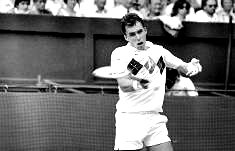 everything that I’ve gotten in there to do and a lot of the pressure is off me and on the young guys.” Second-seeded Ivan Lendl narrowly survived a thrilling 2-hour, 42-minute match with Scott Davis, 4-6, 6-4, 6-4, 5-7, 7-5. He lost the first set to Davis, a 21-year-old Californian and the most prolific junior our country ever had, with 24 titles. Playing in only his second Wimbledon, Davis was making Lendl look like a cow on grass, breaking his serve in the 10th game and whizzing right into a one-set lead. Lendl is big, 6’2 and 190, but he is not stupid. He saw he’s chipping back Davis’ shots because he wasn’t getting enough leverage. So he moved a couple of feet behind the baseline and started teeing off. He won the second set by breaking Davis in the 9th game and the 3rd set, by breaking him in the 5th game. At one point in the third set, Davis got only three points off Lendl’s serve in seven games, and one of those is on a double-fault. Suddenly, in the 4th set, Lendl went completely off the wheels. He lost seven points in a row, including a final double-fault as Davis pulled square, 7-5. The serve that established Lendl’s dominance in the second and third sets deserted him. Davis was serving big. He’s volleying magnificently. The biggest upset of The Big W was at hand as Lendl was broken again for 0:2 in the fifth set. Lendl not only broke Davis, but did it at love. Davis was broken in other ways as well. He went to his chair for the 90-second rest berating himself, furiously furrowing brow. Lendl came roaring back, whipped 14 aces for the day and won seven of the last 10 games to put Davis away. Final score: 4-6, 6-4, 6-4, 4-6, 7-5.
everything that I’ve gotten in there to do and a lot of the pressure is off me and on the young guys.” Second-seeded Ivan Lendl narrowly survived a thrilling 2-hour, 42-minute match with Scott Davis, 4-6, 6-4, 6-4, 5-7, 7-5. He lost the first set to Davis, a 21-year-old Californian and the most prolific junior our country ever had, with 24 titles. Playing in only his second Wimbledon, Davis was making Lendl look like a cow on grass, breaking his serve in the 10th game and whizzing right into a one-set lead. Lendl is big, 6’2 and 190, but he is not stupid. He saw he’s chipping back Davis’ shots because he wasn’t getting enough leverage. So he moved a couple of feet behind the baseline and started teeing off. He won the second set by breaking Davis in the 9th game and the 3rd set, by breaking him in the 5th game. At one point in the third set, Davis got only three points off Lendl’s serve in seven games, and one of those is on a double-fault. Suddenly, in the 4th set, Lendl went completely off the wheels. He lost seven points in a row, including a final double-fault as Davis pulled square, 7-5. The serve that established Lendl’s dominance in the second and third sets deserted him. Davis was serving big. He’s volleying magnificently. The biggest upset of The Big W was at hand as Lendl was broken again for 0:2 in the fifth set. Lendl not only broke Davis, but did it at love. Davis was broken in other ways as well. He went to his chair for the 90-second rest berating himself, furiously furrowing brow. Lendl came roaring back, whipped 14 aces for the day and won seven of the last 10 games to put Davis away. Final score: 4-6, 6-4, 6-4, 4-6, 7-5.
Quarterfinals: (United Press International)
On a day when two unlikely fairy tales came to an end before the presence of a real princess, John McEnroe, Jimmy Connors and Ivan Lendl powered their way into the Wimbledon semifinals Wednesday with straight-set victories. McEnroe, seemingly invincible, steamrollered his way past John Sadri, one of his favorite patsies, 6-3, 6-3, 6-1. Lendl, although in bad temper, defeated Czechoslovakian Davis Cup teammate Tomas Smid, 6-1, 7-6(5), 6-3. McEnroe, who says his game is getting sharper and he is enjoying himself more and more on court, now has a match record of 52-1 this year, the only loss coming to Lendl in the final of the French Open. In the semifinals Friday, McEnroe will face unseeded Australian Pat Cash, who claimed his third seeded scalp by beating No. 6 Andres Gomez of Ecuador, 6-4, 6-4, 6-7(3), 7-6(5). Connors will face Lendl in a rematch of the last two U.S. Open finals. Connors, who won both of those encounters, holds an 11-5 career advantage over Lendl, but in their most recent meeting, at the Tournament of Champions in New York, Lendl humiliated the American by 6-0, 6-0. However, the big story on Centre Court, with Princess Diana attending on a bright, warm afternoon, was the demise of Paul Annacone, a qualifier who had made history by reaching the quarterfinals. Annacone, the 21-year-old New Yorker playing in his first Grand Slam tournament (had already played six Grand Prix events), couldn’t cope with Connors as he dropped a 6-2, 6-4, 6-2 decision, at one point losing nine games in a row. McEnroe, who now has beaten Sadri all 10 times they’ve met, dominated their quarterfinal, and in each of his last three matches he has lost only seven games. “I thought I played pretty good today,” said McEnroe, once again a model of decorum. “For some reason I feel pretty good and relaxed. Maybe it’s because all this stuff was going on before and I felt really good about getting on the court. It gives me a chance to show what I can do and shut people up.” Connors, reaching the semifinals for the ninth time, was trailing, 1:2 in the opening set when he ran off his string of nine consecutive games that carried him to 4:0 in the second set. The two-time champion, using lobs to strong advantage against the hard-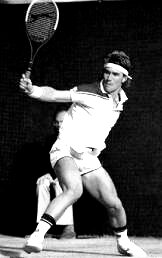 serving New Yorker, then took control of the final set with a break in the third game. “I played well the last three sets against Mayotte, and I continued doing it today,” said Connors, who won eight games at love, six of them on his service. Looking ahead to his semifinal against Lendl, whose least favorite surface is grass, Connors said, “I think he’s used to the grass by now, he has walked on it enough. He has beaten a few good players here, so he can’t have too much of a weakness.” Cash, bidding to become the first Australian man to win Wimbledon since John Newcombe in 1971, used breaks in the third games of the first two sets to win those sets. Gomez, after blowing a 3:0 lead in the 3rd set, won the tie-breaker, but Cash retaliated by taking the fourth set tie-breaker. Gomez was assessed a code violation for slamming the ball in the second set, just missing a lines-woman, and he received a penalty point in the final set. In reaching the semifinals, Cash, 19, has beaten fourth seed Mats Wilander, No. 11 Kevin Curren and now Gomez, seeded sixth.
serving New Yorker, then took control of the final set with a break in the third game. “I played well the last three sets against Mayotte, and I continued doing it today,” said Connors, who won eight games at love, six of them on his service. Looking ahead to his semifinal against Lendl, whose least favorite surface is grass, Connors said, “I think he’s used to the grass by now, he has walked on it enough. He has beaten a few good players here, so he can’t have too much of a weakness.” Cash, bidding to become the first Australian man to win Wimbledon since John Newcombe in 1971, used breaks in the third games of the first two sets to win those sets. Gomez, after blowing a 3:0 lead in the 3rd set, won the tie-breaker, but Cash retaliated by taking the fourth set tie-breaker. Gomez was assessed a code violation for slamming the ball in the second set, just missing a lines-woman, and he received a penalty point in the final set. In reaching the semifinals, Cash, 19, has beaten fourth seed Mats Wilander, No. 11 Kevin Curren and now Gomez, seeded sixth.
Semifinals: Steve Goldstein
Powerful Ivan Lendl wilted under yesterday’s summer sunshine and Jimmy Connors‘ brilliant service returns, while Pat Cash ran short against John McEnroe as the Wimbledon field was reduced to the two men who will vie for the silver Challenge Cup tomorrow. Third-seeded Connors, the two-time Wimbledon champion who always manages to surprise everyone but himself, plucked the second-seeded Czech with a 6-7(4), 6-3, 7-5, 6-1 victory in just under 3 hours. McEnroe, the defending champion and top seed, followed with a 6-3, 7-6(5), 6-4 lesson for the unseeded Australian teenager, who nonetheless made it clear that he was a force to be reckoned with. Connors, who will be 32 in two months, certainly recaptured some of his old magic yesterday in beating a man who had taken 20 straight games from him going into the match. The old warrior’s weapons were his trademark service returns, which were never better, and his indefatigable spirit. 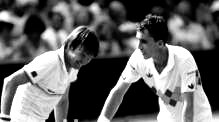 The latter was the more important in the 86-degree heat on Centre Court. Lendl had been practicing for four or five hours a day on grass since he won the French Open. Connors, in his 13th Wimbledon, doesn’t worry as much about the transition from clay to grass, and he had practiced little more than an hour a day, conserving his energy for his matches. The difference was evident. Lendl won the tie-breaker, but neither man lost his serve in the first set, and the only edge was on the scoreboard. Connors finally broke through in the 2nd game of the 2nd set for a 2:0 lead. Lendl didn’t hold a break point until the final game of the set, and he promptly lost that point with a netted service return. Connors won the next two points, and the match was even. Everything turned on that 68-minute second set. Lendl, who was serving well, never attacked the net, preferring to rally from the baseline. Connors, on the other hand, seized any chance to attack. He showed his confidence on grass, while Lendl showed the reluctance of a relative grass-court novice. Lendl finally broke Connors’ serve in the 4th game of the 3rd set for a 3:1 lead. The Czech had two points for 4:1, but his serve deserted him, and he lost the game. Later, Lendl would have two break points for a 5:3 lead, but he lost those, too. By now, more than two hours into the match, Lendl was showing fatigue. “His legs looked a little heavy,” Connors said. “I was cranking my service returns, and he would stand two feet inside the baseline and not move. I’d hit two groundstrokes and sneak in to the net.” Lendl agreed. “My legs got tired,” he said. “I got a little slower for each shot, and Jimmy took advantage of it.” The advantage came in the long 11th game of the third set, when Connors piled up four break points. Lendl saved the first three, but on the fourth, Connors jumped on a second serve and sent it screaming at the Czech’s feet. The shot was unreturnable. Lendl saved two set points, but not a third. His physical fatigue was now joined by a mental letdown. He sagged in the final set, losing his serve three times. Connors, who will be playing in his sixth Wimbledon final, did not escape unscathed. He had cramps in his tired left shoulder and cut his postmatch interview short so he could receive treatment. It was quite a bit cooler when McEnroe and Cash took Centre Court. They had never played each other before, and the early games were like chess, with each feeling the other out. In the ninth game, Cash double-
The latter was the more important in the 86-degree heat on Centre Court. Lendl had been practicing for four or five hours a day on grass since he won the French Open. Connors, in his 13th Wimbledon, doesn’t worry as much about the transition from clay to grass, and he had practiced little more than an hour a day, conserving his energy for his matches. The difference was evident. Lendl won the tie-breaker, but neither man lost his serve in the first set, and the only edge was on the scoreboard. Connors finally broke through in the 2nd game of the 2nd set for a 2:0 lead. Lendl didn’t hold a break point until the final game of the set, and he promptly lost that point with a netted service return. Connors won the next two points, and the match was even. Everything turned on that 68-minute second set. Lendl, who was serving well, never attacked the net, preferring to rally from the baseline. Connors, on the other hand, seized any chance to attack. He showed his confidence on grass, while Lendl showed the reluctance of a relative grass-court novice. Lendl finally broke Connors’ serve in the 4th game of the 3rd set for a 3:1 lead. The Czech had two points for 4:1, but his serve deserted him, and he lost the game. Later, Lendl would have two break points for a 5:3 lead, but he lost those, too. By now, more than two hours into the match, Lendl was showing fatigue. “His legs looked a little heavy,” Connors said. “I was cranking my service returns, and he would stand two feet inside the baseline and not move. I’d hit two groundstrokes and sneak in to the net.” Lendl agreed. “My legs got tired,” he said. “I got a little slower for each shot, and Jimmy took advantage of it.” The advantage came in the long 11th game of the third set, when Connors piled up four break points. Lendl saved the first three, but on the fourth, Connors jumped on a second serve and sent it screaming at the Czech’s feet. The shot was unreturnable. Lendl saved two set points, but not a third. His physical fatigue was now joined by a mental letdown. He sagged in the final set, losing his serve three times. Connors, who will be playing in his sixth Wimbledon final, did not escape unscathed. He had cramps in his tired left shoulder and cut his postmatch interview short so he could receive treatment. It was quite a bit cooler when McEnroe and Cash took Centre Court. They had never played each other before, and the early games were like chess, with each feeling the other out. In the ninth game, Cash double-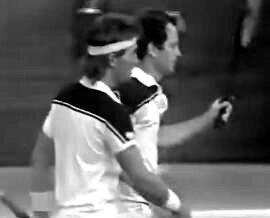 faulted to give McEnroe set point, then followed with by netting a half-volley. Cash didn’t get his first break point until the 9th game of the 2nd set. McEnroe saved the point, and the Princess of Wales, who’d been watching from the royal box, left, apparently feeling that the defending champion had the match well in hand. It looked as if she had made a rash judgment when Cash went up by 4:1 in the tiebreaker and had two serves coming. But McEnroe then won three straight points and six of the next seven, wrapping up the set with a serve wide to the backhand that the Aussie could only pound into the net. “I knew I had a tough job after losing the second set,” Cash said. “I felt I was playing well. It’s just that the better I returned the ball, the better he volleyed it back. That got kind of frustrating.” Cash finally broke McEnroe’s serve in the 2nd game of the 3rd set for a 2:0 lead. McEnroe broke back for 1:2 but struggled again in his next service game. He had lost the rhythm on his serve, partly because he was restricted by a sore right hamstring and partly because the sky was so blue. “I usually use a cloud to tell where the ball is on my toss,” McEnroe said. “With the sky so clear, I couldn’t judge the ball and was hitting it on the way down.” A couple of cumuli must have rolled in shortly afterward, for McEnroe’s serve improved, while a cloud settled over Cash. A backhand pass by McEnroe cost Cash his serve in the 7th game, and that was all the edge the American needed. An ace (his sixth barely) concluded matters after 2 hours 7 minutes.
faulted to give McEnroe set point, then followed with by netting a half-volley. Cash didn’t get his first break point until the 9th game of the 2nd set. McEnroe saved the point, and the Princess of Wales, who’d been watching from the royal box, left, apparently feeling that the defending champion had the match well in hand. It looked as if she had made a rash judgment when Cash went up by 4:1 in the tiebreaker and had two serves coming. But McEnroe then won three straight points and six of the next seven, wrapping up the set with a serve wide to the backhand that the Aussie could only pound into the net. “I knew I had a tough job after losing the second set,” Cash said. “I felt I was playing well. It’s just that the better I returned the ball, the better he volleyed it back. That got kind of frustrating.” Cash finally broke McEnroe’s serve in the 2nd game of the 3rd set for a 2:0 lead. McEnroe broke back for 1:2 but struggled again in his next service game. He had lost the rhythm on his serve, partly because he was restricted by a sore right hamstring and partly because the sky was so blue. “I usually use a cloud to tell where the ball is on my toss,” McEnroe said. “With the sky so clear, I couldn’t judge the ball and was hitting it on the way down.” A couple of cumuli must have rolled in shortly afterward, for McEnroe’s serve improved, while a cloud settled over Cash. A backhand pass by McEnroe cost Cash his serve in the 7th game, and that was all the edge the American needed. An ace (his sixth barely) concluded matters after 2 hours 7 minutes.
Final: (Herald Wire Services)
For this, you got up early on a Sunday morning? The 1984 Gentlemen’s Singles Championship at Centre Court of the All England Lawn Tennis Club was a walkover. Before you could get through the funny papers, John McEnroe, the defending champion, waxed Jimmy Connors, 6-1, 6-1, 6-2, in the serve-and-volley equivalent of a no-hitter. It was a day McEnroe will never forget. He understand, is obsessed with perfection. He wrestles with it. When he fails, even in ways invisible to the rest of us, his mood, his expression, his whole manner of dealing with the world can become ugly. What McEnroe did Sunday was beautiful and, yes, as close to perfect as a performance on a tennis court can be. And McEnroe seemed to realize what he had done. Perhaps it 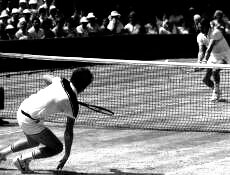 will soothe him on lesser days. For 80 fleeting minutes, McEnroe overwhelmed the crowd at Centre Court and Connors with his artistry. McEnroe was four minutes quicker in beating Connors than Martina Navratilova was in winning the women’s title over Chris Evert Lloyd in two sets Saturday. He made just three unforced errors and allowed Connors a paltry 42 points, only 11 against his service. No matter how long McEnroe continues playing, no matter how many more Wimbledons he wins (he didn’t win another), he will have a hard time surpassing the match he played Sunday. For the first time in a fortnight, McEnroe raised his fist in triumph. Then he cracked a wide smile as he hoisted the winner’s gold cup above his head. The Duchess of Kent asked McEnroe if this wasn’t, in fact, his best performance. McEnroe had to agree with the royal suggestion. “I played about as well I ever have,” said McEnroe, the winner here last year and in 1981 (every time he triumphed in doubles as well). “The thought crossed my mind out there that it’s nice to make your mark on a sport. It’s an honor to be put in the same category as Laver and Borg, to be considered one of the very best.” Connors’ fans understood that their man, appearing in his sixth Wimbledon final, would be doomed if McEnroe’s service was true. So all McEnroe did was fire home 72 percent of his first serves (40 for 55), with 9 aces, 11 service winners and nary a double fault. Was it a historic worst? Hardly. The Wimbledon record for fewest games in the men’s singles final is 20, and the shortest match in the book used up just 37 minutes, when William Renshaw beat John Hartley in 1881. But it was the most lopsided men’s final since 1938, when Henry Austin won only four games from Don Budge, and it made McEnroe the first American man to win consecutive Wimbledons since Budge accomplished it with his victory over Austin. Connors, who offered nothing in the way of an alibi for his lame performance, had a measuring stick of his own. Ten years ago, at age 21, he defeated 39-year-old Ken Rosewall in the final, 6-1, 6-1, 6-4. “I was out there 19 minutes longer than Rosewall,” Connors said of his defeat. Wimbledon fans had hardly put a dent in their seat cushions when McEnroe began to salt the match away. He broke Connors in the second game and held on to take a 3:0 advantage before the two-time champion could compose himself. Connors held at 0:3, but McEnroe broke him again in the sixth game. Serving at 40/30 in the seventh game, McEnroe lashed a service ace at Connors’ feet, and the first set was over in just 21 minutes. “There was a lot of heat out there,” said Connors, and he wasn’t just talking about the 102-degree temperatures (38 Celsius) at Centre Court. “One of those days. He was playing very well, serving real well, and I
will soothe him on lesser days. For 80 fleeting minutes, McEnroe overwhelmed the crowd at Centre Court and Connors with his artistry. McEnroe was four minutes quicker in beating Connors than Martina Navratilova was in winning the women’s title over Chris Evert Lloyd in two sets Saturday. He made just three unforced errors and allowed Connors a paltry 42 points, only 11 against his service. No matter how long McEnroe continues playing, no matter how many more Wimbledons he wins (he didn’t win another), he will have a hard time surpassing the match he played Sunday. For the first time in a fortnight, McEnroe raised his fist in triumph. Then he cracked a wide smile as he hoisted the winner’s gold cup above his head. The Duchess of Kent asked McEnroe if this wasn’t, in fact, his best performance. McEnroe had to agree with the royal suggestion. “I played about as well I ever have,” said McEnroe, the winner here last year and in 1981 (every time he triumphed in doubles as well). “The thought crossed my mind out there that it’s nice to make your mark on a sport. It’s an honor to be put in the same category as Laver and Borg, to be considered one of the very best.” Connors’ fans understood that their man, appearing in his sixth Wimbledon final, would be doomed if McEnroe’s service was true. So all McEnroe did was fire home 72 percent of his first serves (40 for 55), with 9 aces, 11 service winners and nary a double fault. Was it a historic worst? Hardly. The Wimbledon record for fewest games in the men’s singles final is 20, and the shortest match in the book used up just 37 minutes, when William Renshaw beat John Hartley in 1881. But it was the most lopsided men’s final since 1938, when Henry Austin won only four games from Don Budge, and it made McEnroe the first American man to win consecutive Wimbledons since Budge accomplished it with his victory over Austin. Connors, who offered nothing in the way of an alibi for his lame performance, had a measuring stick of his own. Ten years ago, at age 21, he defeated 39-year-old Ken Rosewall in the final, 6-1, 6-1, 6-4. “I was out there 19 minutes longer than Rosewall,” Connors said of his defeat. Wimbledon fans had hardly put a dent in their seat cushions when McEnroe began to salt the match away. He broke Connors in the second game and held on to take a 3:0 advantage before the two-time champion could compose himself. Connors held at 0:3, but McEnroe broke him again in the sixth game. Serving at 40/30 in the seventh game, McEnroe lashed a service ace at Connors’ feet, and the first set was over in just 21 minutes. “There was a lot of heat out there,” said Connors, and he wasn’t just talking about the 102-degree temperatures (38 Celsius) at Centre Court. “One of those days. He was playing very well, serving real well, and I 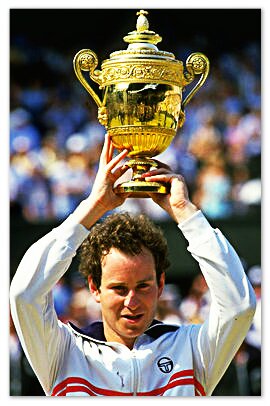 never got started.” The second set was perhaps worse than the first one. McEnroe broke Connors in the first and third games, his serve frustrating the man who is considered the best in the world at return of service. At 3:0, McEnroe air-mailed an ace on the first point and again on the last, beating Connors at love. Connors finally held service at 1:4 but was playing like a man bound to get out of the heat. In the sixth game, up 15/0, McEnroe fell down chasing a drop shot but got to his feet in time to run down Connors’ passing shot and sail a return over his head. “I was hitting the ball well from the back court and hitting my forehand as well as I have the whole tournament,” said McEnroe, who lost a classic, 4-hour 16-minute, five-set Wimbledon final to Connors in ’82. “He tried playing a serve- and-volley game, which is not the way he plays, and he couldn’t do much with his serve.” Connors played his best game of the match down 1:0 in the third set. But it was far too late for heroics, even though McEnroe had frittered away the French Open to Ivan Lendl last month after leading two sets to none. “I thought about it for a moment,” said McEnroe. “I didn’t,” said Connors. “I didn’t lose the French after being up two-love.” But he lost this one, with McEnroe breaking him in the sixth game and the last. “His game is built around his serve,” said Connors, “and when he serves like that, there’s nothing I can do.” McErnoe’s 54th title (7th major). Stats of the final
never got started.” The second set was perhaps worse than the first one. McEnroe broke Connors in the first and third games, his serve frustrating the man who is considered the best in the world at return of service. At 3:0, McEnroe air-mailed an ace on the first point and again on the last, beating Connors at love. Connors finally held service at 1:4 but was playing like a man bound to get out of the heat. In the sixth game, up 15/0, McEnroe fell down chasing a drop shot but got to his feet in time to run down Connors’ passing shot and sail a return over his head. “I was hitting the ball well from the back court and hitting my forehand as well as I have the whole tournament,” said McEnroe, who lost a classic, 4-hour 16-minute, five-set Wimbledon final to Connors in ’82. “He tried playing a serve- and-volley game, which is not the way he plays, and he couldn’t do much with his serve.” Connors played his best game of the match down 1:0 in the third set. But it was far too late for heroics, even though McEnroe had frittered away the French Open to Ivan Lendl last month after leading two sets to none. “I thought about it for a moment,” said McEnroe. “I didn’t,” said Connors. “I didn’t lose the French after being up two-love.” But he lost this one, with McEnroe breaking him in the sixth game and the last. “His game is built around his serve,” said Connors, “and when he serves like that, there’s nothing I can do.” McErnoe’s 54th title (7th major). Stats of the final
*************************************


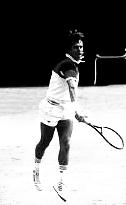
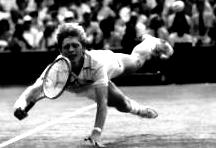
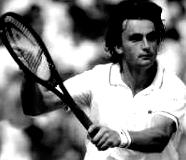
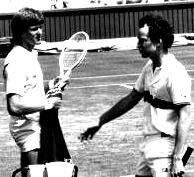
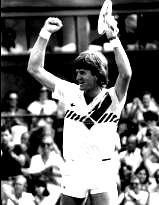

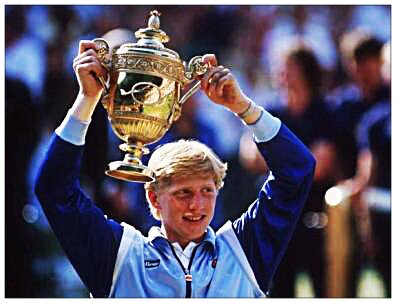
YT films:
1984
Connors vs. Lendl (fragments)
McEnroe vs. Cash
McEnroe vs. Connors
Doubles final
1985
French: (short clips)
Leconte vs. Lendl
Becker vs. Leconte
Connors vs. Acuna
German:
Film about the tournament
Becker vs. Curren